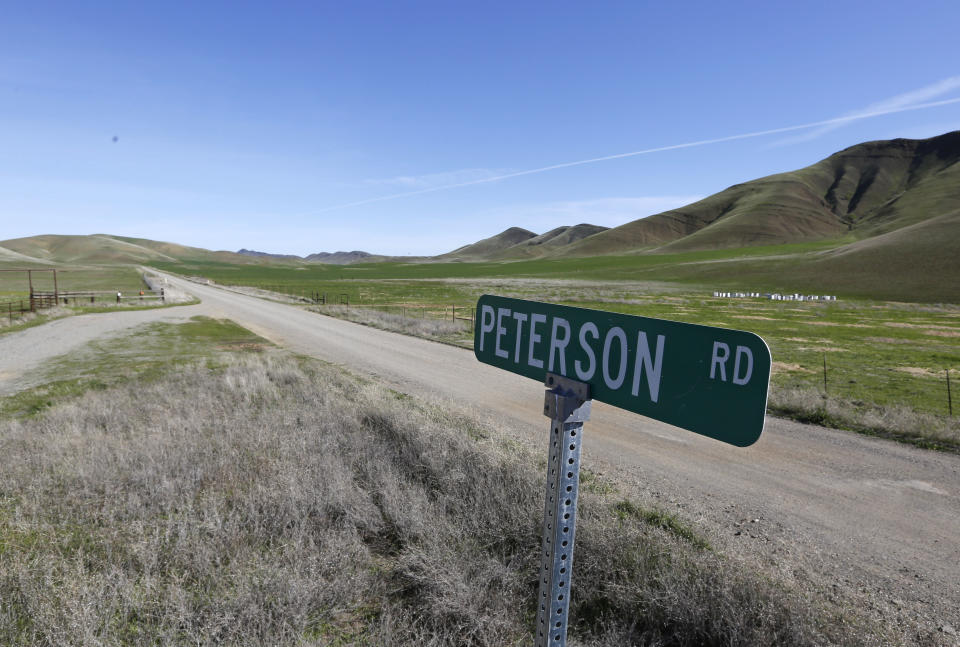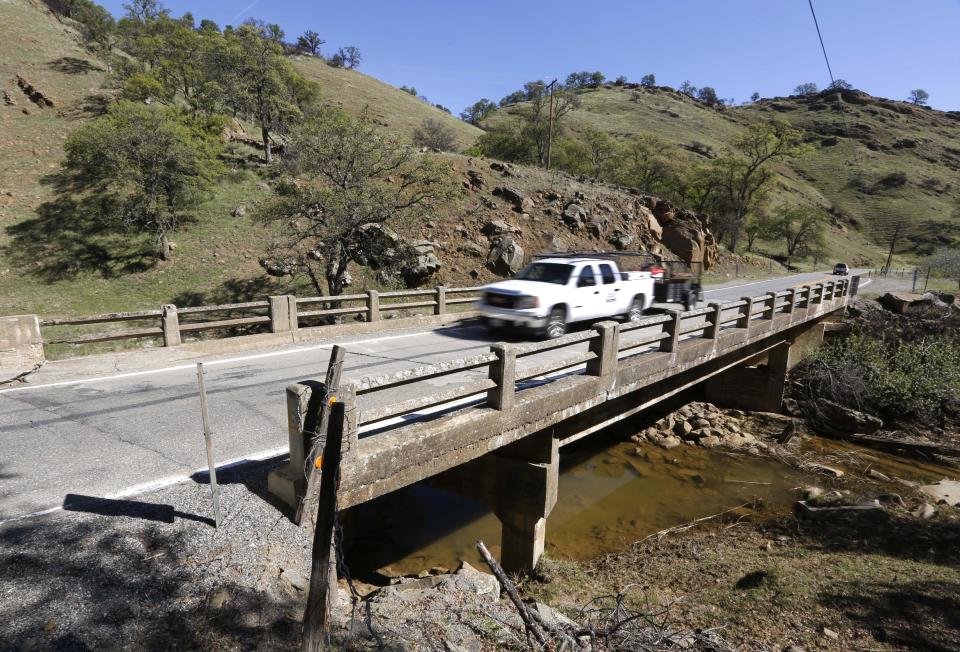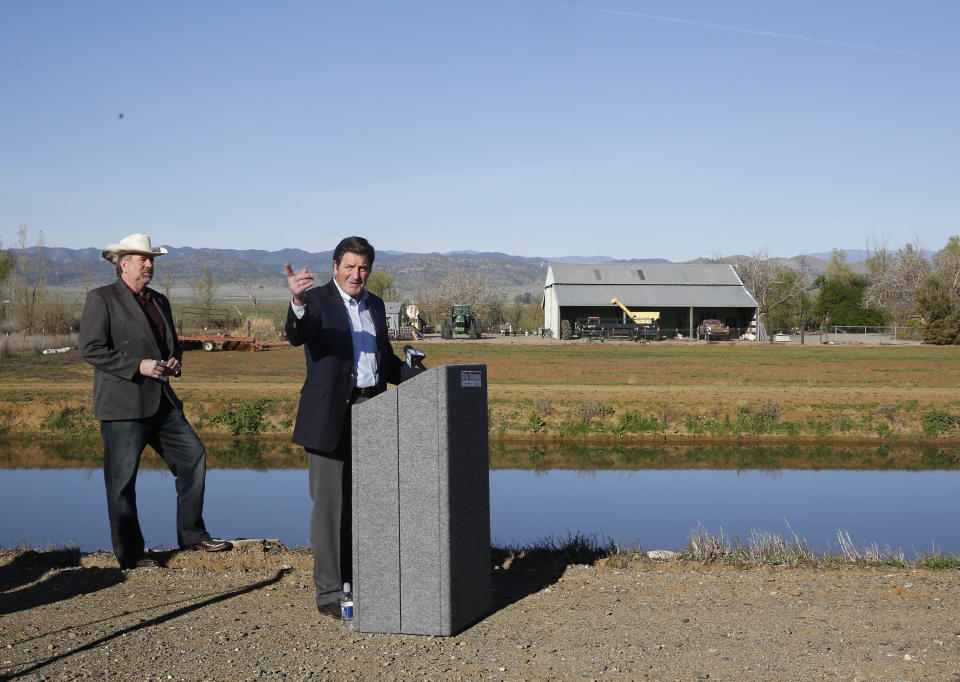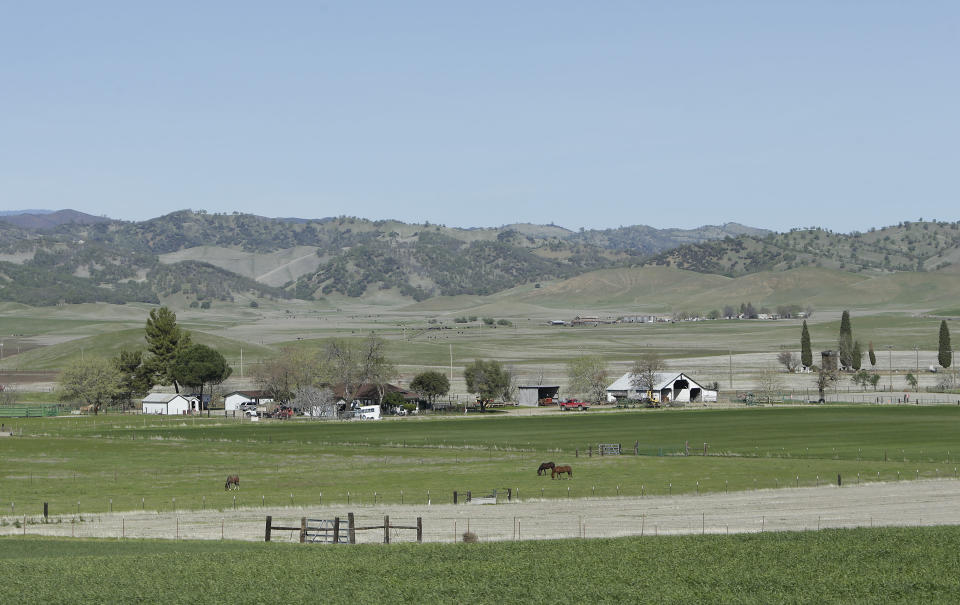Congress focuses on dams amid California's drought
WASHINGTON (AP) — California's drought has sparked a new push by federal lawmakers to create or expand a handful of reservoirs around the state, ramping up a political battle that former Gov. Arnold Schwarzenegger once referred to as a "holy war in some ways."
Government agencies have been studying five major water storage projects for nearly two decades, with nothing to show for the effort so far.
Meanwhile, the state's water problems have only grown worse. California has had its third relatively dry winter in a row and court rulings have mandated that more water be released from reservoirs to sustain fish species in Northern California's delta. At the same time, the nation's most populous state, now at 38 million residents, continues to grow beyond the capacity of a water storage and delivery system that was mostly completed in the late 1960s.
This winter is among the driest on record, forcing some communities to ration water and leading farmers to fallow thousands of acres that otherwise would be producing vegetables, fruits and nuts for the nation.
The state Legislature is expected to debate water storage options later this year as it seeks compromise on a multibillion dollar water bond for the November ballot. But California's congressional delegation has provided a jumpstart.
Bills proposed in Congress would authorize a number of projects to expand or create reservoirs. Among the projects are raising the dam at Shasta Lake to store more water in California's largest reservoir, creating a new reservoir in the Sierra Nevada along the upper San Joaquin River east of Fresno and damming a valley north of Sacramento.
Other storage options include expanding the dams at the San Luis Reservoir in the central part of the state and at Los Vaqueros Reservoir in the eastern San Francisco Bay Area.
Authorizing such projects through federal legislation would be a prerequisite for dedicating money to a project in the future.
Democratic Sen. Dianne Feinstein said those who oppose new or expanded dams are hoping that doing so will deter growth and development, but it's a losing battle.
"Growth comes anyway," she said in a telephone interview with The Associated Press. "Then you don't have enough water."
Feinstein acknowledges that conservation also is critical to meeting the state's water needs but said some new or expanded reservoirs must be allowed so more water can be captured during wet years and stored for use during the dry ones.
"They have a certain prior, I don't know how to put it, stigma to them," she said of dams. "But this is a different day now. And it's a day that's been coming for a long time. Somehow, we've got to measure up to it."
In California, water often is a shared commodity between the federal government, the state and local users.
Feinstein is urging the state Legislature to modify the bond measure on the November ballot to prioritize both water storage and conservation. She would like to see $3 billion dedicated in the bond to developing storage, with an additional $2 billion set aside for restoring the Sacramento-San Joaquin River Delta, the heart of California's water-delivery system.
Doing so would be intended to appease both farmers and the environmentalists.
No doubt there will be opposition. The $1 billion proposal to raise the dam at Shasta, for example, would flood part of the McCloud River, one of the most picturesque rivers in the state. It also would inundate several sacred sites of the Winnemem Wintu, a small tribe that is not federally recognized.
In general, creating and expanding reservoirs are among the most expensive and environmentally harmful ways to address California's water issues, said Doug Obegi, an attorney with the Natural Resources Defense Council. He said investing in water recycling, storm water capture in urban areas and similar projects provides a greater return on investment.
He said he failed to see how the current storage projects would help California's overall water supply, with so many reservoirs already far below their capacity.
"It just doesn't add up to a lot of water," he said.
Peter Gleick, director of the Pacific Institute and one of California's leading water experts, said major dam projects "worked fine when there was new water to be had and when we didn't care about the environment. But those days are over."
Republicans already have pushed through legislation in the House that would authorize construction for four of the storage projects. But the main thrust of the bill, sponsored by Republican Rep. David Valadao and co-sponsored by every GOP member of California's delegation, would cease the implementation of a lawsuit settlement designed to restore salmon populations on the San Joaquin River.
Water dedicated to maintaining fish and wildlife would instead go to farmers and communities who receive water through the federal Central Valley Project. That bill has no chance to pass the Senate in its current form.
As an alternative, Feinstein and fellow California Sen. Barbara Boxer, also a Democrat, are pushing legislation that would give state and federal agencies more flexibility to pump water out of the delta to aid farmers, as long as the pumping does not violate the Endangered Species Act.
But one aspect of the House bill Feinstein endorses is the call for more major storage projects.
"We should have some federal authorization of dam projects that have a positive cost-benefit ratio," she told the AP.
The sharpest difference between the House bill and what Democrats seek is that the House version relies strictly on the state to pay for new or larger dams. Democrats say the federal government should help cover some of the costs.
Rep. Jim Costa, a Democrat from the Central Valley farming region, said he doubts the projects will get off the ground without federal money.
He has sponsored three bills — to authorize expanding the dams at Shasta Lake and San Luis Reservoir, and to build the Temperance Flat dam on the San Joaquin River. Cost-sharing arrangements, which he called crucial to the projects eventually getting built, would be negotiated later.
Costa rejected the sentiment that conservation and recycling should be relied upon instead. He said the drought is so severe that every tool is needed.
"You cannot recycle in enough quantities to irrigate half the nation's fruits and vegetables," he said. "It's really that simple."
He said he believes prospects for more storage are better now because more parts of the state are feeling the pain from the drought.
Others are more pessimistic. During a congressional hearing last week in Fresno, Republican Rep. Tom McClintock, who represents a vast district in Northern California, said a "radical ideology" has made its way into California water policy.
"Translation: That means these dams will not get built," he said.
___
Associated Press writer Scott Smith in Fresno contributed to this report.







